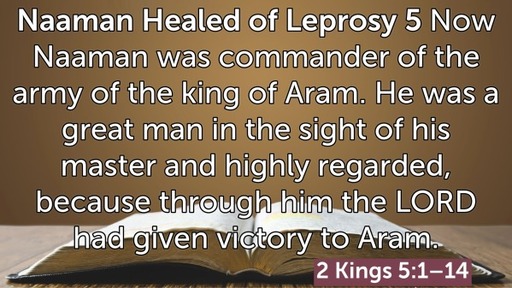Elisha & Naaman

Sermon • Submitted • Presented • 33:30
0 ratings
· 71 viewsFiles
Notes
Transcript
Sermon Tone Analysis
A
D
F
J
S
Emotion
A
C
T
Language
O
C
E
A
E
Social
OT is a foreign country
OT is a foreign country
Such a different world.
NT is relateable. We can see much of ourselves in the people and stories. OT is different. strange. Told in a totally different way.
I’ve been reading a book over the last few weeks by a Chinese-American author, and the style is quite different to what I’m used to. Everything is in a third person narrative. Everything is written as if teh author is transcribing a great story-teller who has the room spell-bound.
There’s the close echo of a non-written, oral story-telling culture.
The same is true of so much the scrolls of the OT.
We tend to categorise books like Judges and Samuel, and Kings and Chronicles as the “History” books of the OT. And they are. But they’re a very different sort of history.
They’re a history designed to draw the listener into the story. To learn truths and God and about humankind written not only in the lines on the page, but, perhaps especially, written between the lines. We learn as much from what isn’t said, as from what is said.
Three stories
Three stories
Called Kings - but really about the prophets
Israel king thinks Aram king is picking a fight
It’s not about them. In this story, they’re not even named
Naaman and Elisha
Naaman and Elisha
Naaman. commander of the army of Aram. Rich. Famous. Popular. A bit of a celebrity. His name means “fair” “gracious”. Let’s just say he was known for his looks. Then he gets leprosy, a disfiguring disease.
A man who is used to command and admiration becomes desperate for healing and seeks out the man of God
Elisha is a man on a mission. He’s going to show this foreign upstart who is really the boss.
Naaman comes with his horses and chariots - a naked display of power.
Elisha won’t even come to the door.
So much posturing, and bickering and one-upmanship
Is this how God works?
Is this the lesson that we’re supposed to learn?
That my God is better than your God, and I don’t even have to give you the time of day?
Of course, on one leve, you could argue, that’s true. No-one can heal Naaman except the one true God, the author and perfecter of life itself. But I’m not sure that that is all we are supposed to learn from this story.
If that’s all we learn, that our arrogant posturing is better than their arrogant posturing because God really is on our side, then we’ve missed the point somewhere along the way.
I think people miss this point all the time.
Now and then.
In our own time we have all too many people who believe that because we have God on our side, we can do whatever we want. Behave however we see fit.
Ancient Israel was no different.
The last 12 scrolls of the OT are a group know collectively as teh minor prophets. To sum them up, their theme is that Israel is mistaken in thinking that they will prevail because God is on their side by default. Rather, God is on the side of the orphan, the weak, the poor and the oppressed. God has withdraws his favour from Israel because they have gone after others Gods, and after the pursuit of their own selfish ambitions. The minor prophets call God’s people back to teh true worship of the Lord:
He has shown you, O mortal, what is good. And what does the Lord require of you? To act justly and to love mercy and to walk humbly with your God.
The Third Story
The Third Story
There’s a third story too:
The unnamed servants.
The enslaved Jewish girl who seeks the healing of her oppressor. What a powerful image.
The unnamed servants who bring Naaman down from his high horse.
Where do we see the character of God in this story?
In the kings?
In the prophets?
Or in the slaves?
In the book of Kings,
which is about the prophets,
we see the character of God
embodied amongst slaves and servants.
Let that sink in for a bit.
So, where are we?
So, where are we?
Are we like the kings? Calculating? Afraid? More concerned about our schemes and battles than about the people who surround us?
Or are we like the prophet and the commander, so full of our own hubris that we spend our time posturing and vying for position?
I think that so often this is the case.
We all desire greatness.
We all imagine that are the heroes of our own stories.
But what happens when my story clashes with your story?
There can only be one hero.
Or maybe we could be like the servants - nameless in the story, even as we embody the character of God.
WWJD?
Sometimes used like the prophet in this story, as a measuring stick to judget that we are better than others by default because we’re Christian.
That’s not what Jesus would do (finger-wagging)
But when we ask that question with genuine humility and a desire to be re-made in teh image of Christ, then great healing can come.
Not always dramatically.
Not in a way that will win us fame or adulation.
But ina simple, soulful way.
A way that brings healing.
A way that brings life.
Taht where we find teh Good news in this story.
Beneath the headlines
Out of teh limelight
unnamed, and unknown, but never insiginificant.
Amen
